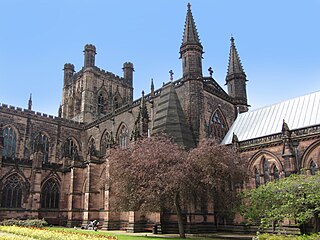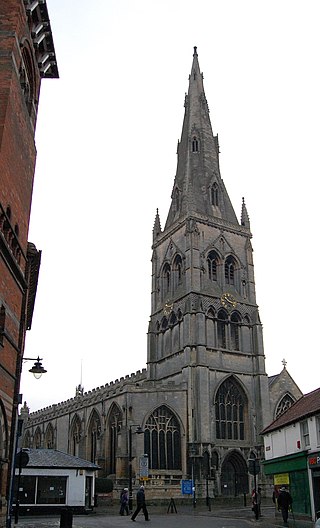
Sherborne Abbey, otherwise the Abbey Church of St. Mary the Virgin, is a Church of England church in Sherborne in the English county of Dorset. It has been a Saxon cathedral (705–1075), a Benedictine abbey church (998–1539), and since 1539, a parish church.

Chester Cathedral is a Church of England cathedral and the mother church of the Diocese of Chester. It is located in the city of Chester, Cheshire, England. The cathedral, formerly the abbey church of a Benedictine monastery dedicated to Saint Werburgh, is dedicated to Christ and the Blessed Virgin Mary. Since 1541, it has been the seat of the Bishop of Chester.

St Mary's Church is an Anglican parish church in Nantwich, Cheshire, England. The church is recorded in the National Heritage List for England as a designated Grade I listed building. It has been called the "Cathedral of South Cheshire" and it is considered by some to be one of the finest medieval churches, not only in Cheshire, but in the whole of England. The architectural writer Raymond Richards described it as "one of the great architectural treasures of Cheshire", and Alec Clifton-Taylor included it in his list of "outstanding" English parish churches.

St Mary's Church is the Anglican parish church of Lymm, Warrington, Cheshire, England, standing on a bank overlooking Lymm Dam. It is a grade II listed building. It is an active church in the diocese of Chester, the archdeaconry of Chester and the deanery of Great Budworth.

St Mary Magdalene Church, Newark-on-Trent is the parish church of Newark-on-Trent in Nottinghamshire, England. It is dedicated to Mary Magdalene and is the tallest structure in the town.

Saint Mary's Church, is the civic church for the city of Southampton, Hampshire, England. Originally founded in circa 634, St Mary's has been the mother church of Southampton since its inception. The present building, now the sixth incarnation of a church on this site, dates mostly to a rebuilding from 1954 to 1956, following its destruction in the Southampton Blitz, except for the notable Grade II listed tower and spire, which date from 1912 to 1914.

St Mary's Church is in the town of Windermere, Cumbria, England. It is an active Anglican parish church in the deanery of Windermere, the archdeaconry of Westmorland and Furness, and the diocese of Carlisle. Its benefice is united with that of St Martin's Church, Bowness-on-Windermere; St Anne's Church, Ings; St Cuthbert's Church, Kentmere; St James' Church, Staveley and Jesus Church, Troutbeck. The church is recorded in the National Heritage List for England as a designated Grade II listed building.

St Oswald's Church is in Church Road, Worleston, Cheshire, England. It is an active Anglican parish church in the deanery of Nantwich, the archdeaconry of Macclesfield, and the diocese of Chester. Its benefice is combined with those of St Mary, Acton, St Bartholomew, Church Minshull, and St David, Wettenhall. The church is recorded in the National Heritage List for England as a designated Grade II listed building.
Lilian Josephine Pocock (1883–1974) was a stained glass artist who provided stained glass for a number of buildings, including Ulverston Victoria High School, The King's School and Ely Cathedral. She was also a theatrical costume designer, book illustrator and watercolourist. In her later years, failing eyesight prevented her from continuing her work in stained glass. After some years of retirement she died in 1974.

St Mary's Church stands on a hill in the town of Ellesmere, Shropshire, England. It is an active Anglican parish church in the deanery of Ellesmere, the archdeaconry of Salop, and the diocese of Lichfield. The church is recorded in the National Heritage List for England as a designated Grade I listed building.

Henry Haig was an English abstract artist, painter and sculptor but notable predominantly for his stained glass work.

The Church of St James is the parish church for the village of Kingston, located on the Isle of Purbeck in Dorset. The church is a notable example of the Gothic Revival style and is a Grade I listed building.

St Stephen's Church is a Church of England church in Park Avenue, Bush Hill Park in the London Borough of Enfield.

St Margaret's Church is the parish church of Hopton-on-Sea in the English county of Norfolk. It is dedicated to St Margaret of Antioch. St Margaret is also the dedication of the former church, which was destroyed by fire in 1865. The ruins of the former church remain standing, and are still consecrated. Both the old and new churches are Grade II* listed. Until 1974, Hopton-on-Sea was called Hopton ; the formal name for the benefice remains Hopton. The church is in the Diocese of Norwich, and is within the deanery of Lothingland and archdeaconry of Norfolk.
St Mary the Virgin Church is a parish church in Welling in the London Borough of Bexley. It is dedicated to the Virgin Mary. The church is in the Archdeaconry of Lewisham & Greenwich, in the Diocese of Southwark. It is notable for the range of 20th-century art contained within it.
St Mary and All Saints Church is the parish church of Little Walsingham in the English county of Norfolk. It is dedicated to the Virgin Mary and All Saints. Little Walsingham was the location of the shrine of Our Lady of Walsingham, destroyed at the Dissolution. The Anglican shrine was revived by Alfred Hope Patten, the Vicar of Little Walsingham, in 1922, and the image of Our Lady of Walsingham was in the church until its translation to the new priory in 1931.

St Anne's Church is a former Church of England parish church in the village of Hessenford in Cornwall. It is dedicated to St Anne, the mother of the Virgin Mary. The church is in the Archdeaconry of Bodmin, in the Diocese of Truro. The church is largely the work of J P St Aubyn, and is Grade II listed.

St Mary's Church is the parish church of Holme-next-the-Sea in the English county of Norfolk. It is dedicated to the Virgin Mary. The church is partly early 15th-century Perpendicular, and partly later reconstruction. It is Grade I listed.

St Nicholas's Church is a parish church in Kimmeridge, Dorset. It is dedicated to St Nicholas of Myra. The church is in the Archdeaconry of Dorset, in the Diocese of Salisbury. The church is of 12th-century origin, much restored and rebuilt in the 19th century. It is Grade II listed.

















